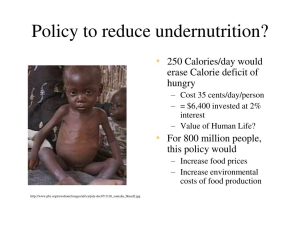Introduction Malnutrition, often overshadowed by more visible global health crises, silently casts its long shadow over millions of lives. It is a complex problem with two contrasting faces: undernutrition and overnutrition. This article delves into the insidious consequences of malnutrition, exploring how these twin specters affect health, society, and economies. 1. The Price of Undernutrition
Introduction
Malnutrition, often overshadowed by more visible global health crises, silently casts its long shadow over millions of lives. It is a complex problem with two contrasting faces: undernutrition and overnutrition. This article delves into the insidious consequences of malnutrition, exploring how these twin specters affect health, society, and economies.
1. The Price of Undernutrition
Health Consequences:
- Stunted Growth: Undernutrition, particularly in childhood, can lead to stunted growth and development, affecting physical and cognitive potential.
- Weakened Immune System: Malnourished individuals have compromised immune systems, making them more susceptible to infections and diseases.
- Impaired Cognitive Function: Undernutrition can hinder brain development, resulting in cognitive impairments that can affect education and life opportunities.
Societal and Economic Impact:
- Reduced Productivity: A malnourished workforce is less productive, impacting economies on a large scale.
- Healthcare Costs: Treating diseases related to undernutrition strains healthcare systems and increases costs.
- Educational Challenges: Cognitive impairments stemming from undernutrition hinder educational attainment, perpetuating the cycle of poverty.
Image By: https://image3.slideserve.com
2. The Paradox of Overnutrition
Health Consequences:
- Obesity: Overnutrition often leads to obesity, a condition associated with a higher risk of chronic diseases like diabetes, heart disease, and certain cancers.
- Metabolic Disorders: Malnutrition in the form of overnutrition can lead to metabolic disorders such as insulin resistance and fatty liver disease.
- Mental Health Impact: Overnutrition has implications for mental health, with links to conditions like depression and anxiety.
Societal and Economic Impact:
- Healthcare Burden: The rise in obesity-related diseases increases the burden on healthcare systems, resulting in significant costs.
- Lost Productivity: Absenteeism and reduced work productivity among overweight and obese individuals impact economies.
- Quality of Life: Overnutrition diminishes individuals’ quality of life, affecting their overall well-being and indirectly impacting society.
3. The Global Malnutrition Crisis
Health Consequences:
- Nutrition Transition: Many regions experience a “nutrition transition” where undernutrition and overnutrition coexist, straining healthcare systems with a dual burden of disease.
Societal and Economic Impact:
- Double Burden of Disease: The coexistence of undernutrition and overnutrition strains healthcare systems, impeding economic development.
- Educational Challenges: Overnutrition-related health issues affect education, limiting opportunities and perpetuating poverty.
4. The Complex Interplay
Malnutrition is not a clear-cut binary; it is a complex interplay of factors. Undernutrition can exist alongside overnutrition within the same communities, reflecting the paradox of the global food system.
Solutions:
- Promoting Nutrition Education: Education on healthy eating can help prevent both undernutrition and overnutrition.
- Sustainable Food Systems: Ensuring access to a diverse range of nutritious foods from sustainable sources can combat malnutrition.
- Healthcare and Policy Interventions: Implementing healthcare interventions and policies that address malnutrition’s complexities are vital.
Image By: https://www.ncfamily.org
Conclusion
Malnutrition, both undernutrition and overnutrition, presents an intricate challenge that extends far beyond individual health. It leaves an indelible mark on societies and economies, shaping the trajectory of nations. As we confront this issue, we must recognize that addressing malnutrition requires a multifaceted approach, from nutrition education to policy interventions and the creation of sustainable food systems. The consequences of malnutrition are far-reaching, and the battle to overcome them is not only a health imperative but a societal and economic one. It is a challenge that requires collaboration and concerted efforts to usher in a world where all individuals enjoy not only enough food but also the right food for a healthy, prosperous future.



















Leave a Comment
Your email address will not be published. Required fields are marked with *